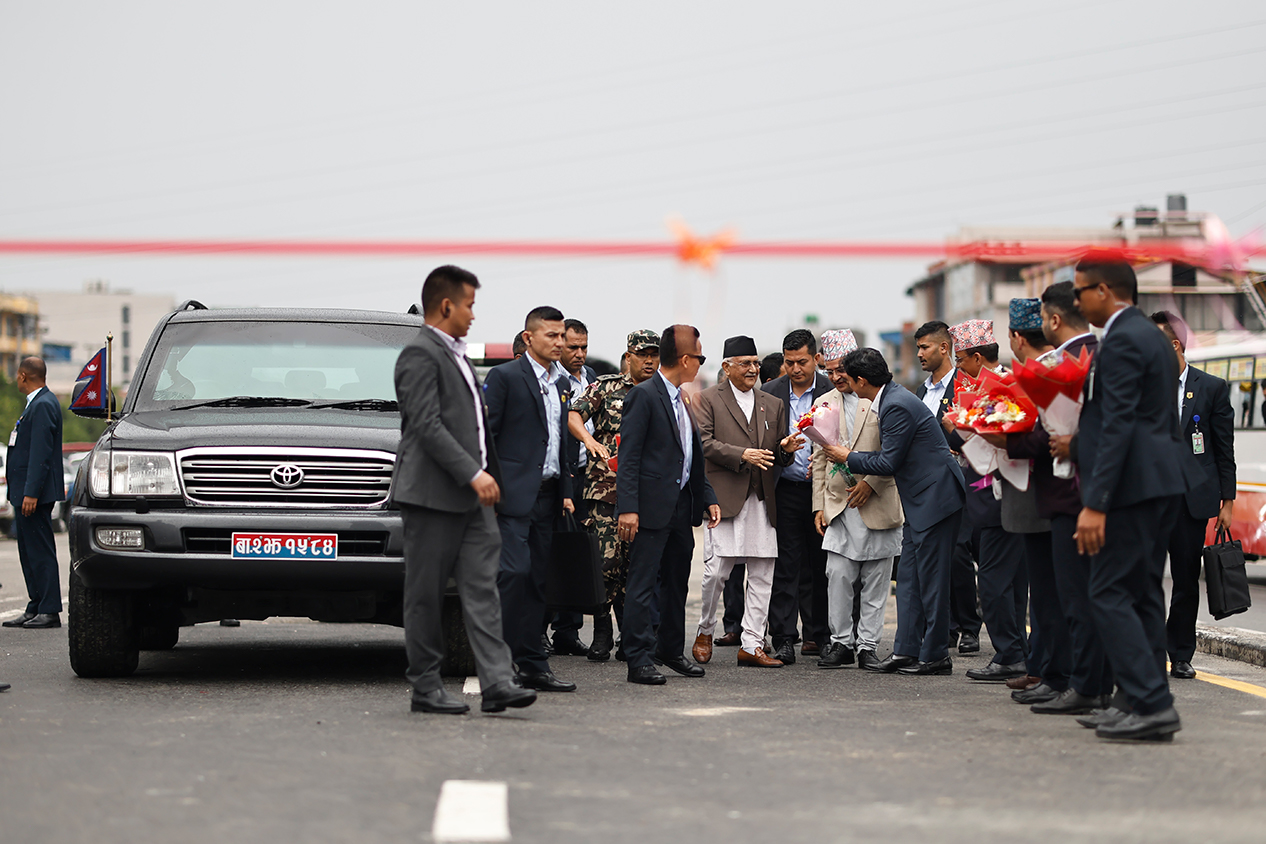

KATHMANDU: During the 2022 House of Representatives election, Nepali Congress President Sher Bahadur Deuba was Prime Minister. After the election, on December 25, 2022, Deuba stepped down as Prime Minister.
The bodyguards deployed during his tenure, Nepal Police Deputy Superintendents (DSPs), did not return. On the same day, a new government was formed under the leadership of CPN (Maoist Centre) Chairman Pushpa Kamal Dahal.
Nepal Police DSPs were deployed for his security as bodyguards. Dahal resigned in July 2024, after he failed to garner the majority in the parliamentary vote of confidence.
However, the security personnel, including his bodyguards, did not return. According to the Procedure for Security of Very Important and Important Persons, 2024, the sitting President, Vice President, Prime Minister, Speaker, National Assembly Chair, and Chief Justice are included in the list of very important persons.
According to the procedure, even after leaving office, the government provides security to important persons. However, there was a discrepancy in placing security personnel arbitrarily based on influence after leaving office.
According to government procedures, the Home Ministry deploys police for the security of important persons.
The procedure specifies that former presidents and former prime ministers are assigned security personnel led by a Nepal Police DSP, with two personnel from Nepal Police and sixteen from the Armed Police Force under a DSP.
Ironically, Deuba retained DSP bodyguards for two and a half years, and Dahal for one year after leaving office. Neither the DSPs wanted to return, nor did the Police Headquarters recall them.
Following the interim government’s decision, police, including DSPs, were recalled from the homes of Dahal and Deuba.
Upon discovering that police were unnecessarily stationed at the leaders’ residences, the Home Ministry decided on October 9, 2025, to remove the security personnel placed beyond standards by former important persons.
While implementing the decision, it was found that Dahal had 34 personnel beyond the prescribed number, and KP Oli had 27 personnel for security.
By that time, the DSPs assigned to Oli’s security had been promoted and retired. Seventeen Nepal Police personnel, including DSPs, returned from Deuba’s security detail.
On September 9, 2025, during the Gen Z protest, thirty Armed Police personnel deployed for Deuba’s security had already returned.
It has been an old problem that police do not return personnel deployed beyond standards, and the Home Ministry previously overlooked it. In 2020 AD, the Home Ministry created a new procedure citing misuse of security personnel for household work, which was later amended in 2024 AD.
“A former prime minister retained DSP bodyguards and other security personnel even after leaving the office, and the police did not investigate this,” says an official from Police Headquarters.
“When the Home Ministry made this decision, it was found that for two to two and a half years, the former prime minister kept DSP-led security personnel at home as if still a sitting prime minister.”
According to security standards, DSP-ranked bodyguards are deployed for the sitting prime minister. Under the bodyguard’s leadership, personnel are stationed at Baluwatar at the level of a local police office.
At least ninety police personnel are deployed under a bodyguard at Baluwatar. The Armed Police Force deploy teams under either a Police Inspector or DSP.
After the Home Ministry decision, 297 Nepal Police and Armed Police Force personnel deployed for important persons’ security were recalled by October 13, 2025.
Police Headquarters found 197 personnel deployed beyond standards. Of these, 177 police personnel were recalled. “The remaining are on leave and will return afterward,” said Nepal Police Spokesperson DIG Binod Ghimire.
According to him, personnel deployed beyond standards are being recalled. “Almost all security personnel have been returned,” Ghimire said.
Former security officials note that important persons or politicians in Nepal face no external security threats. Security challenges arise from internal issues, political disputes, and dissatisfied party workers.
According to the Armed Police Force headquarters, 100 police personnel have been returned so far. The recall process is ongoing, and Armed Police Force co-spokesperson DSP Shailendra Thapa could not confirm the exact number deployed.
Even with security procedures, personnel can be added or reduced based on security assessments, according to a Police Headquarters official.
Those dissatisfied with the procedure may request additional security personnel from the Home Ministry.The ministry can increase personnel based on threat assessment.
The procedure was implemented after extensive study and analysis. According to the procedure, former Home Ministers can have two Nepal Police personnel under a DSP for five years. After five years, these personnel must be withdrawn.
“Security personnel deployed beyond standards for important persons are being recalled,” says Home Ministry spokesperson Ananda Kafle. “Personnel deployed beyond standards are returned regardless of numbers.”
The Home Ministry refused to provide details of how many security personnel were recalled from each individual. “This is a security matter and cannot be made public, and it is not allowed to disclose how many personnel are assigned to each important person,” Kafle said.
Former security officials note that important persons or politicians in Nepal face no external threats. Security challenges come from internal problems, political disputes, and dissatisfied party workers.
Security for important persons is based on confidential strategies adopted by security agencies.Former Police Deputy Inspector General Hemanta Malla Thakuri says that security personnel should be deployed after evaluating the ctual security threat for retired important persons.
“The Home Ministry knows which higher-ranking officer is deployed based on increased security threats,” he said. “Most security threats for leaders come from their own party workers. During the Gen Z protest, the presence of party workers in vandalism and arson incidents at leaders’ homes confirmed this.”